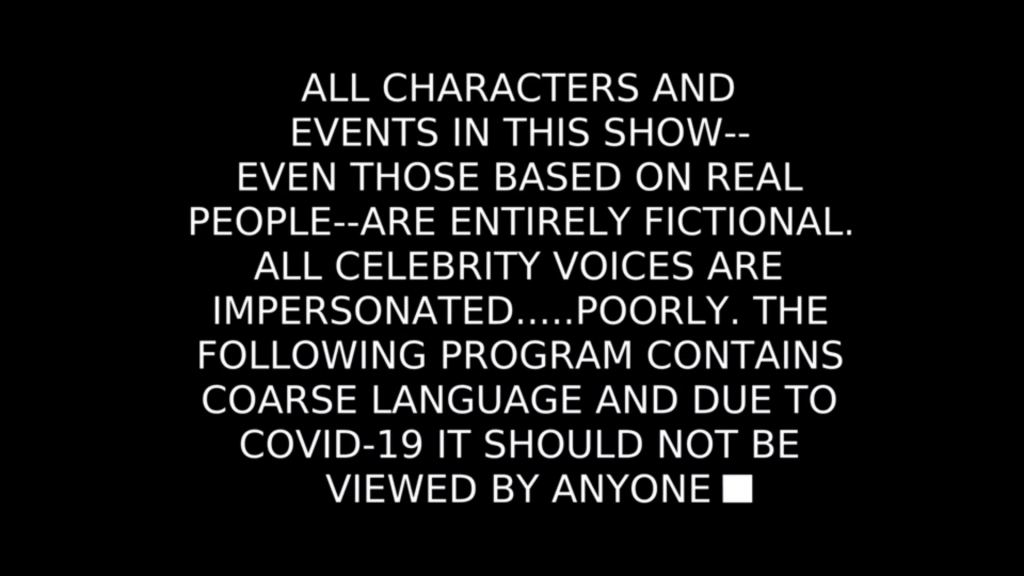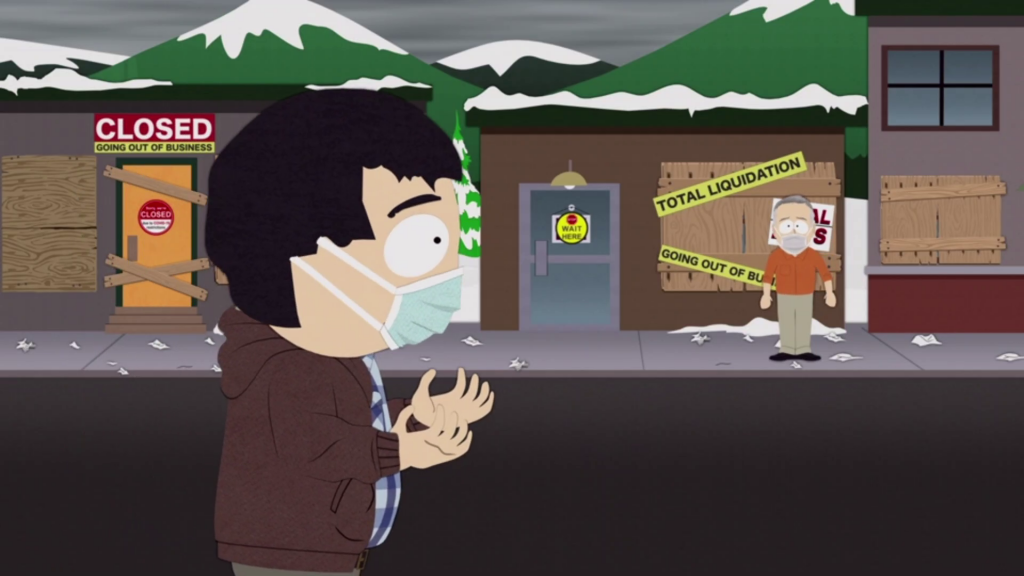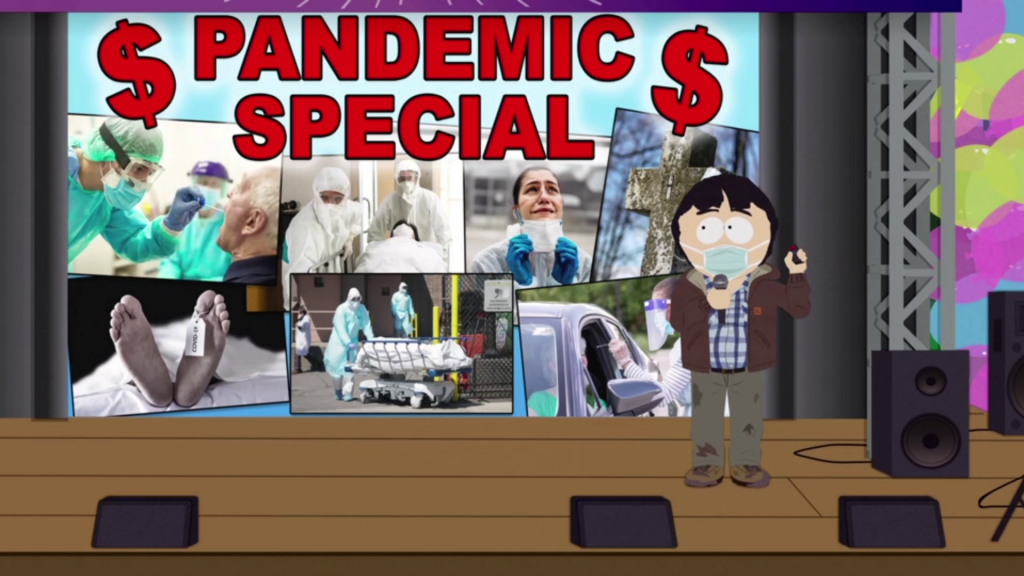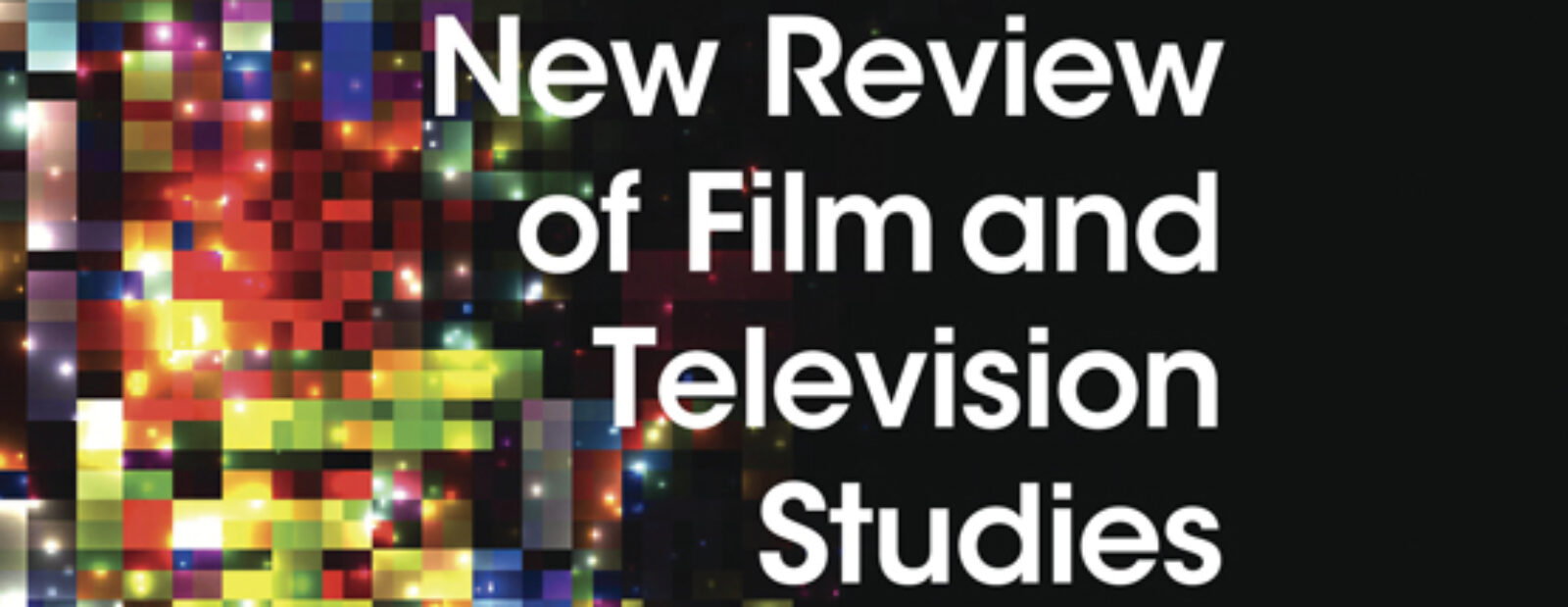By David McGowan

The devastation of the Covid pandemic has created anxieties for producers, especially in television comedy, about whether to mimic current real-world conditions in these fictional spaces, or to instead provide a relief from a subject that does not appear especially conducive to raucous humor. The “cold open” sequence that began the final season of Brooklyn Nine-Nine (2013-2021) briefly acknowledged a passage of time, where characters had needed to socially distance and wear masks, but quickly shifted to a post-Covid environment after its opening titles. Conversely, the final season of Superstore (2015-2021) gave much greater focus on the pressures placed upon the retail environment, frequently showing characters wearing protective equipment and adjusting to new safety guidelines. The animated series South Park (1997-) has arguably been the most provocative in its representation of the pandemic, transforming not just its storylines, but also its very format, in response to the on- and off-screen challenges of Covid and media production.
South Park is certainly no stranger to topicality. As the documentary 6 Days to Air: The Making of South Park (airdate 09/10/2011) indicates, episodes are usually written and produced in the week leading up to broadcast – an act that is greatly facilitated through the use of digital (rather than analog) animation techniques, even though the series continues to gesture towards a “low-fi,” seemingly handmade aesthetic. This has enabled the show to be extremely timely in many of its storylines, with instalments covering subjects often still fresh in the news headlines. The Covid pandemic prevented South Park from delivering its regular annual seasons in either 2020 or 2021. However, due to the show’s underlying digital production methods, it was instead possible to arrange for remote working, focusing on lengthier “specials” in place of weekly episodes. At the time of writing, South Park Studios has delivered both “The Pandemic Special” (airdate 09/30/2020) and “South ParQ Vaccination Special” (airdate 03/10/2021), available on Comedy Central and HBO Max in the United States, as well as the hour-long “made for TV movie” South Park: Post Covid (2021), the first of a series of planned features for the streaming service Paramount+. As the very titles of these productions indicate, the current health crisis receives particular focus.
South Park has a long history of dealing with tragedy, frequently covering topics that most mainstream comedies would actively avoid. For instance, the first episode to broadcast after the September 11 attacks – “Osama bin Laden has Farty Pants” (airdate 11/07/2001) – directly addresses the impact on American (and indeed global) society. “The Pandemic Special” goes even further in transforming its characters’ lives, acknowledging a world where most human interaction is taking place over Zoom, where stores and restaurants are going out of business, and where Death is presented as a literal figure stalking some of the town’s citizenry. The emotional toll is addressed through Stan Marsh, who claims to be concerned for the wellbeing of a fellow classmate, Butters, as a means of disguising his own feelings of helplessness and despair. The instalment concludes with Stan finally admitting that he is also personally struggling, but the narrative offers no easy answers to these problems. “South ParQ Vaccination Special” further explores the impact of lockdown on the main characters, placing a seemingly irresolvable strain on the friendship group that has been the central focus since the very first episode. The follow-up movie, Post Covid, set in 2061, not only imagines a future in which the disease remains a concern of everyday life, but also reveals that the estrangement between the series regulars endures over the subsequent decades.

The specials nonetheless provide the usual, crude South Park humor, implying that the character Randy Marsh is responsible for creating Covid, having had sex with a pangolin during a trip to China with Mickey Mouse (creating a narrative link to the earlier episode “Band in China,” airdate 10/02/2019). There is also satirical commentary on police brutality and the Black Lives Matter protests, the presidency of Donald Trump (using the show’s own racist stand-in, Mr. Garrison), and QAnon conspiracy theories. The creators address the suitability of mining these subjects for comedy, with Sharon Marsh challenging her husband’s decision to make a strain of marijuana, also entitled the “Pandemic Special,” which becomes popular with the townsfolk. At the beginning of the instalment, Sharon notes that “these are very serious times, and nobody wants or cares about your stupid special,” and later accuses Randy of prioritizing his own financial gain in making the “special” when society is struggling to deal with more important issues. This recurring gag is clearly presented in a manner that highlights the double meaning to the viewer.

Such meta references reflect an example of South Park’s creators, Trey Parker and Matt Stone, engaging in “othering” (Hollows 2003, 49), emphasizing self-aware cult sensibilities to distance the franchise from its wider business interests. South Park has proven extremely lucrative, and these special texts have undoubtedly been effective in helping to make up for the revenue lost due to the temporary hiatus on regular season production. “The Pandemic Special” enjoyed a significant boost in viewership on Comedy Central and other Viacom-owned television stations, garnering the franchise’s highest “live” broadcast ratings in over seven years (Thorne 2020). The “Special” was also the first new South Park content to be added to HBO Max, which had secured streaming rights from Hulu in 2019, in a deal rumored to be worth more than $500 million (Low 2019). The Post Covid movie was marketed as a tentpole release for the newly-launched Paramount+ (a rebranding of the previous service CBS All Access). Indeed, it was announced in August 2021 that Parker and Stone had inked a new deal with Viacom – claimed to be worth $900 million – which guaranteed South Park’s future as a series until at least 2027, as well as committing to production of fourteen of the TV movies for Paramount+ (Parker and Weprin 2021). South Park has undoubtedly been enshrined as a media institution, complicating the “outsider” sensibilities that the show touted – and made a significant part of its appeal – upon its original debut in the 1990s.
Since the show’s eighteenth season, which roughly coincided with the show’s first major streaming deal with Hulu in 2014, South Park has also intensively explored narrative arcs crossing between episodes and even between seasons, seemingly capitalizing on the maximized “binge-watching” opportunities that this new online distribution offered. The recent special episodes continue a storyline about Mr. Garrison’s presidency that has been running since the nineteenth season, while Randy Marsh’s marijuana business, Tegridy Farms, has dominated several plots since season twenty-two. For new viewers wanting to fully make sense of the “Special” episodes and the Post Covid movie, it is necessary to engage with content on at least two different platforms: Paramount+, and either Comedy Central or HBO Max. For longer-term fans, consumption of these texts may well have crossed over many additional outlets, including the previous streaming on Hulu, the rotating collection of ad-supported episodes available on South Park Studios’ website, and various DVD/Blu-ray collections.
The increasing serialization of South Park – moving beyond just the regular series and into specials and TV movies – has arguably sparked a creative surge for the creators, allowing a shake-up to the existing formula of a show that has already produced more than 300 episodes. At the same time, however, it is also a shift that exploits the financial possibilities of new technologies and modes of media distribution. Both the “Vaccination Special” and the Post Covid movie end on moments of narrative irresolution, encouraging an ongoing consumer commitment to the cable television and streaming services that will offer further instalments and a continuation of the wider narrative. While the exploration of alternative production methods and formats was partly necessitated by Covid – filling a gap when regular season production was simply not feasible – it also firmly positions South Park within the “post-network era” (Lotz 2014, 8), where content can be offered across as many platforms as possible. At the end of the “Vaccination Special,” Stan remarks that “it’s been a hard year. And I think for some people there’s just no going back.” This refers to the breakdown of the main characters’ friendship, but it feels an apt metacommentary on the South Park franchise itself. The current expectation is that the show will resume its annual seasons in 2022, but it also emerges from the pandemic as a transformed text, one that appears newly emboldened to reshape itself as needed to meet the changing demands of the media landscape.
Read David McGowan’s article ‘No longer “As Crappy as Possible”?: Cult sensibilities and the high-definition revisioning and “Unbleeping” of early seasons of South Park’
References
Hollows, Joanne. 2003. “The Masculinity of Cult.” In Defining Cult Movies: The Cultural Politics of Oppositional Taste, edited by Mark Janovich, Antonio Lázaro Reboll, Julian Stringer and Andy Willis, 35-53. Manchester: Manchester University Press.
Lotz, Amanda D. 2014. The Television Will Be Revolutionized. 2nd ed. New York: New York University Press.
Low, Elaine. 2019. “HBO Max Wins ‘South Park’ Streaming Rights for Over $500 Million.” Variety, October 29. https://variety.com/2019/tv/news/south-park-stream-exclusively-hbo-max-1203387212 (accessed 1 December 2021).
McGowan, David. 2021. “ ‘No Longer as Crappy as Possible’?: Cult Sensibilities and the High-Definition Revisioning and ‘Unbleeping’ of Early Seasons of South Park.” New Review of Film and Television Studies 19(4).
Parker, Ryan, and Alex Weprin. 2021. “‘South Park’ Creators Trey Parker and Matt Stone Sign $900m ViacomCBS Deal, 14 Movies Planned for Paramount+.” The Hollywood Reporter, August 5. https://www.hollywoodreporter.com/movies/movie-news/14-south-park-films-parker-stone-deal-1234993150 (accessed 1 December 2021).
Thorne, Will. 2020. “‘South Park’ Pandemic Special Delivers 7-Year Ratings High.” Variety, October 1. https://variety.com/2020/tv/news/south-park-pandemic-special-ratings-high-1234789661 (accessed 1 December 2021).

